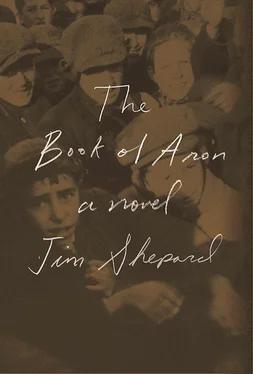The next day the kids were talking about how many people had been shot all over the ghetto. Korczak told Madame Stefa to let me sleep, so the room was set up for the day around me. I told myself I wasn’t going to move and if I cried until I dried out that was fine too. No one knew how many people had been killed. One of the staff members finally told Mietek that she’d heard they’d all been connected to an illegal newspaper. Korczak said this didn’t need to be discussed with the children within earshot. The next day I was made to get up and do some chores and when I was washing dishes I overheard him tell Madame Stefa the Jewish Council had circulated a memorandum saying that the Germans said the executions had been a singular event and wouldn’t be repeated.
After that there were daily roundups at barricades the Germans set up on different streets with a few sawhorses and signs. Once the barricades went up you only had a few minutes to get away before the cross streets and alleys were blocked too. “Now the day’s a success if you just manage to get where you’re going without an incident,” Madame Stefa said.
Korczak’s solution to all of this was letter-writing. Just because things were as bad as they could be, he said, that didn’t mean we had to accept that action was useless.
All of those with acceptable penmanship were set to writing Please if possible send packages to the Orphans’ Home at 16 Sienna Street for the sick children . He said there was more and that he would dictate the rest. He said to write that peaceably they run around and play, these children who so recently arrived wounded, frozen, abused, hungry, and hunted. Some of the kids asked how to spell peaceably and he told them it didn’t matter. He said to write that there was no food for them and a lot of the smaller children had stopped growing. That nightmares and weeping were their permanent experiences. And yet his teaching had been borne out, since when the adult community wouldn’t provide a stable or rational environment the children could create for themselves a world that was functional and tender. I wrote that sentence twice, I was so taken with it. He said to write that there were always more children imploring him to be admitted, coming to him in groups on the street and making their proposals like little skeletal aldermen. He said to sign the letters with our names and then for Dr. Henryk Goldszmit/Janusz Korczak/The Old Doctor from the Radio .
FOR THREE DAYS I DIDN’T LEAVE MY BED EXCEPT FOR meals and Korczak again told them to leave me alone. The bedbugs spared only the bottom of my feet. During the day, before the kids hung the blackout paper, a new rule said they had to stand to the side of the windows to watch the street, because now the Germans were firing at any movement indoors. A policeman the staff members called Frankenstein because he looked and acted like the monster in the film never missed an opportunity, they said, to break a window if he saw a silhouette.
The kids watched the roundups at the barricades. They could hear them starting with the whistles and the shouting. Sometimes they saw someone they knew. Jews went by carrying all sorts of things: cages or bowls or horns. One had a pot with a seedling in it. They were all going to the depot the Germans called the Umschlagplatz where the trains took them away.
On the fourth day Korczak again got me up to go on his rounds with him. Madame Stefa insisted he wear a warmer shirt and he had to struggle into it. She had to help him with his suspenders.
Out on the street he couldn’t remember where he was going. In one doorway he rang the bell and said to me, “What did I come to see him about?” In the gloom of another he said, “What is it I’m looking at?” The instep of his shoe came loose and flapped when he walked. The coal smoke in the air left grit on our teeth. Everyone moved as if in a daze and looked at me like I was a piece of bread. A woman ahead of us in a shop complained about the price and Korczak said to her, “Listen. These aren’t goods and this isn’t a store. You’re not a customer and he’s not a shopkeeper. So you’re not being cheated and he’s not profiting. This is just what we’ve decided to do, given that we have to do something.” On the way back his legs were so swollen he had to hire one of the bicycles with seats attached for passengers. He asked me to choose the strongest-looking driver and while we rode he leaned over to me and said in a hoarse voice that he was always moved by how gentle and quiet the drivers were, like oxen or horses.
MORE KIDS GOT SICK BUT MADAME STEFA STILL slept downstairs with the healthy ones and Korczak upstairs in the isolation ward. “It’s cold for May,” he said to me one night when I came up to sit with him. He was writing something while everyone else slept.
“What’s that smell?” I asked.
“The carbide in the lamp,” he said.
The vodka bottle was gone. “What’s that?” I asked.
“Raw alcohol I mix with water and a dissolved hard candy for sweetener,” he said. He asked why I hadn’t eaten dinner and when I told him I hadn’t wanted to, he said fatigue and apathy were symptoms of malnutrition. I asked why he hadn’t eaten dinner and he said eating was work and that he was tired.
I sat next to him on Jerzyk’s bed. Jerzyk was sweating and his eyes were open. “Alcohol mixed with warm water takes away the ache and sore eyes,” Korczak said.
While he wrote he kept his face close to the paper. “What are you writing?” I finally asked.
He said it was to the Judenrat, requesting he be allowed to take over the public shelter that housed a thousand children on Dzielna Street. He said on his application he was spreading rumors that he was a thief who would let children starve so he could qualify for the job. He’d said he was unbalanced and excitable and his health had passed the test in the Gestapo’s prison the year before: that despite the exacting conditions there, not once had he reported sick, not once had he requested a doctor, not once had he absented himself from work in the prison yard. He said he told them that he presently ate like a horse and slept soundly after ten shots of vodka and that experience had now endowed him with the ability to collaborate with criminals and born imbeciles.
“What does the job pay?” I asked him.
He said he’d requested a trial period and a minimum of twenty thousand złotys for the children’s upkeep.
“Do you think you’ll get it?” I asked.
“I already got it,” he said. “I was handed the job permanently and given one thousand złotys. Who’s going to deny the Old Doctor from the Radio the privilege of overseeing kids who are dying at the rate of ten a day?”
“So then what are you writing?” I asked him.
“I had imagined the criminal types among the personnel there would voluntarily leave since they obviously found the place so hateful,” he said. “And they were bound to it only by cowardice and inertia. But instead they closed ranks against me. I’m the stranger. The enemy. The one good nurse died of tuberculosis. I’m trying to get the rest sacked.”
“The salt of the earth dissolves and the shit remains,” I told him. It was something Lutek always said.
“That describes it,” Korczak said.
Jerzyk told us he was thirsty and Korczak pulled himself off his bed and went down to the kitchen and returned with a cup of water. “Here I have four ways of dealing with undesirable newcomers,” he said to me. “I bribe them; I agree to anything; I lie low and mark time, waiting for the moment to strike; or I wear them out. There, none of these will work.”
“Thank you,” Jerzyk said, and Korczak told him he was welcome.
“Today everyone will be restless because I’ve got a headache,” he said. “Or because it’s cold. Or because they want an outing.” Jerzyk drank his water.
Читать дальше












